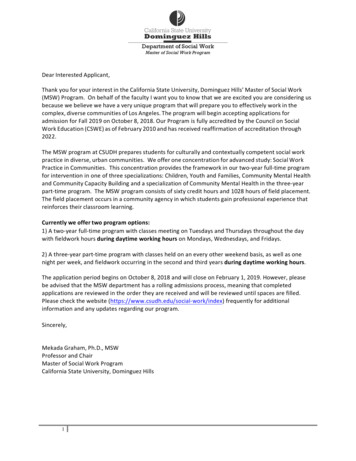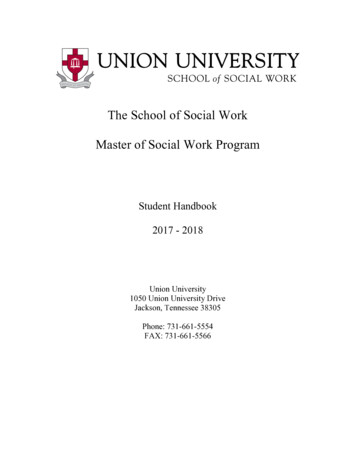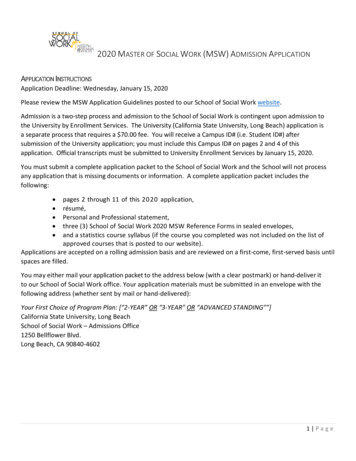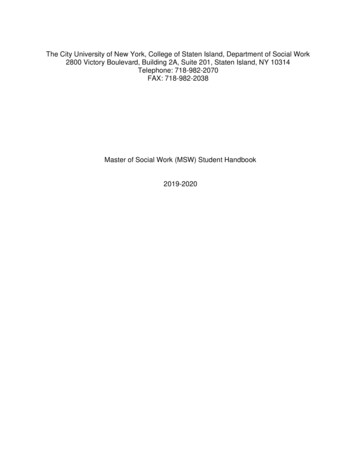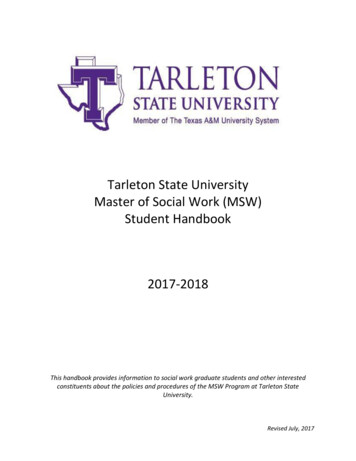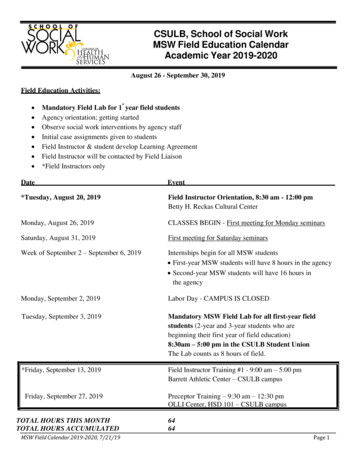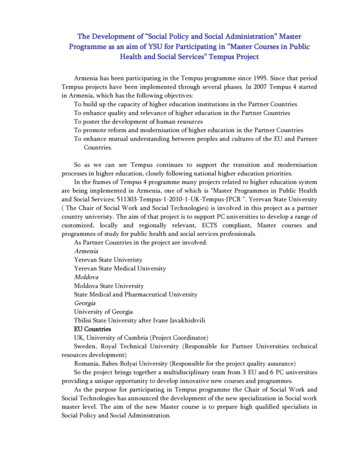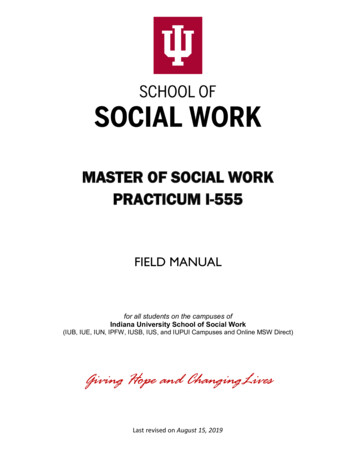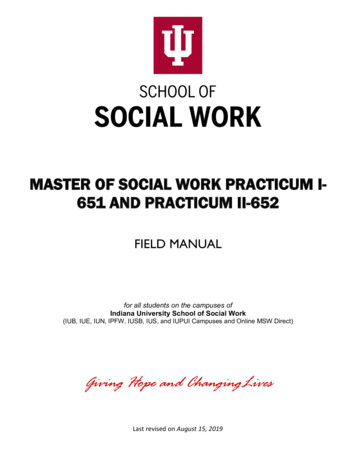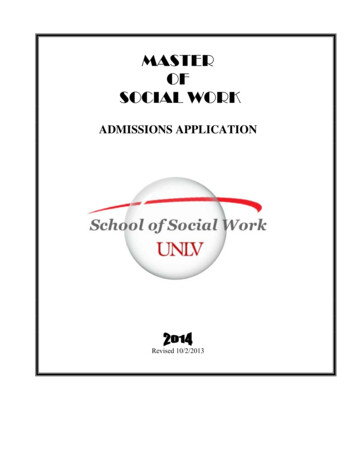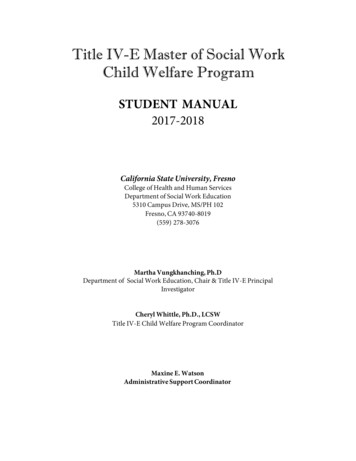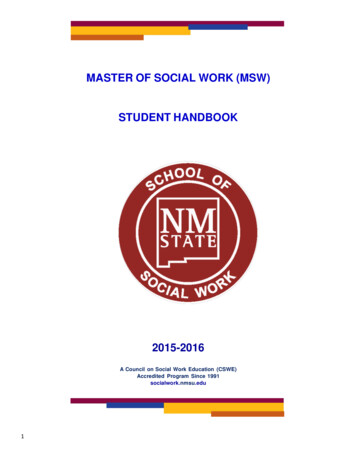
Transcription
MASTER OF SOCIAL WORK (MSW)STUDENT HANDBOOK2015-2016A Council on Social Work Education (CSWE)Accredited Program Since 1991socialwork.nmsu.edu1
School of Social Work Contact InformationMailing AddressSchool of Social Work, MSC 3SWNew Mexico State UniversityP.O. Box 30001Las Cruces, NM 88003-8001Telephone: (575) 646-2143Fax: (575) 646-4116Building Address for DeliveriesNMSU School of Social WorkHealth and Social Services1335 International MallLas Cruces, NM 88003-8001Email: socwork@nmsu.eduWeb: socialwork.nmsu.eduSchool of Social Work StaffHancock, TinaAssociate Dean/DirectorCevallos, EricAdministrative AssistantHernandez, IrmaBSW Academic AdvisorOrta, EmmaMSW Academic AdvisorBuilding Address for Deliveries-ABQNMSU School of Social WorkPine Tree Corporate Center4501 Indian School Rd. Suite 100Albuquerque, NM 87110Telephone: (505) 830-2856Fax: (505) u.eduRm. 210GRm. 210FRm. 210BRm. 210ESchool of Social Work FacultyBarnett-Queen, TimothyAssoc. ProfessorBlair, RobertAssoc. ProfessorCabada, Maria OlgaColl. Assoc. Professor/Field DirectorDe La Rosa, IvanAssoc. ProfessorGurrola, MariaAssoc. Professor/MSW Program CoordinatorMorris, MeghanAsst. ProfessorOrtiz, MariaCollege Asst. Prof/Field CoordinatorNedjat-Haiem, FrancesAssociate 46-5515646-7599646-1243Rm. 221Rm. 203CRm. 203KRm. 203ARm. 210CRm. 203GRm. 207Rm. 203DGergerich, ErikaMoseley, AnaLehman, JamesSBIRT ege Assistant ProfessorColl. Assoc. Professor/SBIRT Co-DirectorAssoc. ProfessorSBIRT Graduate Assistant ly and Child Welfare Training Project StaffBrazell, BobAdministrative Assistant505-872-9268 or 646-0325Hancock, CamilleProject Director505-888-7564 or 646-0326Iglesias, DawnProgram Specialist646-5711Montoya, MonicaChild Welfare Scholars Program Manager646-6342Nunez, GloriaEvent Planner646-4874646-4551Pearce, DanaSenior Fiscal AssistantMontoya, DavidProgram Manager646-0334Cohen, DouglasProgram Manager, Sr.646-0324646-1718Conference RoomABQ CenterABQ CenterRm. 232CRm. 232DRm. 232ERm. 232FABQ-113ABQ-112Rm. 232BABQ Center Faculty & StaffBurns, SusanChavez Neuman, VeronicaWhittlesey-Jerome, WandaSmith, Michele1161071141152Coll. Asst. Prof/MSW Field CoordinatorABQ Center DirectorAssociate ProfessorABQ MSW Academic cneuman@nmsu.eduwkjerome@nmsu.edusmithma@nmsu.edu
Welcome!We are pleased that you have chosen to attend the School of Social Work (SSW) at New Mexico StateUniversity. Through active participation in the classes you attend, the field settings you choose, the friendshipsyou develop and the opportunity to work with our outstanding faculty in this exceptional multiculturalenvironment you will create the foundation for your professional social work practice.Guided by the principles of a strengths perspective, empowerment, and cultural competence, the School of SocialWork prepares students for ethical, effective social work practice. The School of Social Work is committed toserving people through teaching, outreach, leadership, research, service and the development of knowledge,values and skills that promote the profession's ability to respond to individuals, families, groups andorganizations and communities in a culturally diverse environment among populations of the Southwest. Weinvite you to be part of our mission by becoming an advanced generalist social work practitioner, committed topursuing social justice and empowering individuals and families in multicultural communities.On behalf of NMSU, thank you for choosing our program for your educational needs and future professionaldevelopment. Please feel free to contact us if you have any questions or if there is anything more we can do toenhance your experience at NMSU.Tina Hancock, DSWAssociate Dean and Director of School of Social WorkMaria A Gurrola, MSW, PhDGraduate Program Coordinator3
The School of Social WorkNew Mexico State UniversityP.O. Box 30001, MSC 3SWLas Cruces, New Mexico 88003Email: socwork@nmsu.eduTelephone: 575.646.2143Facsimile: 575.646.4116ContentsOVERVIEWSchool of Social Work at New Mexico State UniversityMissionHistoryMaster of Social Work ProgramMSW CURRICULUMSocial Work CompetenciesFoundation Sequence: Generalist Social Work PracticeConcentration Sequence: Advanced Generalist Social Work PracticeField WorkTechnology Expectations and RequirementsCourse LoadCourse and Program WithdrawalCredit for Life or Work ExperienceMSW Two-Year Foundation Plus Concentration PlanMSW Three-Year Foundation Plus Concentration PlanAdvanced Standing One-Year PlanAdvanced Standing Two-Year PlanElectivesChanging Program Completion PlanSpecial Social Work ProgramsChild Welfare Scholars ProgramDual MSW/MPH Degree ProgramMasters International ProgramsInterdisciplinary Graduate MinorsMinor in Alcohol and Drug CounselingMinor in GerontologyUNIVERSITY AND GRADUATE SCHOOL POLICIESGraduate School Provisional StatusTransfer of CreditsAppeal of GradesNMSU Student Accessibility Services (SAS)Students’ rights and responsibilities regarding Title IXPolicies for Student ProtectionSafety and Risk ManagementSexual Harassment and other Forms of Prohibited 1414151515161616161616
Student Conduct: Code of Conduct and Academic MisconductCode of ConductAcademic MisconductACADEMIC, BEHAVIORAL AND PROFESSIONAL STANDARDS FOR MSW STUDENTSStandards of Scholarship: GradesBehavioral and Professional Standards for MSW StudentsProfessional ConductFelony, DUI/DWI or other Criminal RecordCounseling in--Problem Resolution ProcessSchool of Social Work’s Policies on Academic MisconductDismissal from the ProgramReinstatementADVISEMENTMSW Academic AdvisingMSW Faculty AdvisingAdvisor RolesChanging AdvisorsChanging RegistrationGRADUATING FROM THE MSW PROGRAM -ADVANCEMENT TO CANDIDACYGraduate FormsCheck List for Masters Degree CandidatesFinal ExaminationFormat and Structure of the ExaminationResearch Option: ThesisHuman Participants in ResearchSTUDENT RELATED POLICIES OF THE SCHOOL OF SOCIAL WORKStudents’ rights and responsibilitiesSchool Governance and Graduate StudentsMail and Announcement NotificationCommunication with Faculty and StaffFINANCIAL AID AND GRADUATE ASSISTANTSHIPSScholarship OpportunitiesAPPENDIX I: MSW COURSE CATALOGUE 22223232323242424242425252527
OVERVIEWSchool of Social Work at New Mexico State UniversityThe School of Social Work at New Mexico State University is located within the College of Health and Human Services. The MSWprogram is offered at both the NMSU main campus in Las Cruces and at the NMSU Center in Albuquerque. The program preparesadvanced level social work practitioners with the professional values, knowledge, and skills to engage in Advanced Generalist socialwork practice. The curriculum is designed according to the requirements of the Council on Social Work Education (CSWE) and usesthe foundation competencies developed by CSWE. The educational model upon which the program is built proposes that there are twolevels of social work education--foundation and the concentration. A common core of social work values, knowledge and methodsunifies practice at both levels. This core is based on a liberal arts education and draws heavily from the social sciences.MissionGuided by the principles of the strengths perspective, empowerment, and cultural competence, the School of Social Work preparesstudents for ethical, effective social work practice. The School of Social Work is committed to serving people through teaching,outreach, leadership, research, service and the development of knowledge, values and skills that promote the profession's ability torespond to individuals, families, groups and organizations and communities in a culturally diverse environment among populations ofthe Southwest.HistoryIn 1969, New Mexico State University began offering baccalaureate courses in social welfare. In 1972, with the help of Dr. CorinneWolfe and a Section 707 grant, the University developed a baccalaureate social work program within the Sociology and AnthropologyDepartment. In 1975, the BSW Program was accredited by the Council on Social Work Education, and in 1980 Social Work became aseparate academic department. The move to departmental status was part of an overall university reorganization that created theCollege of Human and Community Services, now known as the College of Health and Social Services.Responding to national, regional and state needs, in 1990, the University and the State implemented the Masters of Social WorkProgram. Some of the needs that prompted this move included the professionalization of public child welfare services created throughFederal Court Orders and social work licensure. State agencies were in dire need of practitioners with advanced skills in working withfamilies in multicultural settings. The School of Social Work continues to play a prominent role in meeting unique and emerging socialservice needs. In 1999, the Department received status as a School of Social Work within the College of Health and Social Services.In 2008 the School of Social Work changed its second year concentration from Family Centered Practice in Multi-Cultural Settings toAdvanced Generalist Social Work Practice. This change has sparked a new curriculum and an emphasis on competency based socialwork education.Master of Social Work ProgramThe MSW program is composed of a foundation sequence of 30 credit hours and a concentration sequence of an additional 30 credithours. The program can be completed in either two or three years. Students who are admitted as Advanced Standing complete sixcredit hours of coursework prior to entry into the concentration sequence, resulting in a total of 36 credit hours. Advanced Standingstudents may complete their program in either three semesters or six semesters, including summers. Advanced Standing is offeredonly to graduates of CSWE accredited BSW programs who meet specific admissions criteria.MSW CURRICULUMSocial work education is built on two components: classroom education and field practice experience. The curriculum is organizedinto content areas: Practice, Human Behavior & Social Environment, Policy, Research and the Field Experience. Courses are taught ineach of these areas at both the Foundation (Generalist) and Concentration (Advanced Generalist) levels. Students may occasionallycomplete elective courses in areas that complement their interests.Social Work CompetenciesIn accordance with the Council on Social Work Education, the School of Social Work follows the Educational Competencies asdescribed in the Educational Policy and Accreditation Standards (EPAS 2008).Foundation Sequence: Generalist Social Work PracticeThe purpose of the first (or generalist) year is to provide the basic foundation that distinguishes social work from other helping6
professions. This foundation is taught in terms of knowledge-guided frameworks for effectively managing the various phases of theempowerment process with the multiple levels of client systems with whom we work in direct practice. The definition of generalistpractice is below:Generalist social work practitioners work with individuals, families, groups, communities and organizations in a variety ofsocial work and host settings and apply ethical principles and critical thinking to practice. The generalist practitioneridentifies with the social work profession and is grounded in the dual perspective of the person and the environment.Utilizing knowledge of the human condition, generalist practitioners view clients and client systems from a strengths andresiliency perspective in order to recognize, support, and build upon the capabilities of all human beings. They use acollaborative process to engage, assess broker services, advocate, counsel, educate, and organize with and on behalf of clientsand client systems. In addition, they participate in community and organizational development. Generalist practitioners areconsumer informed, are involved in research-informed (evidence based) practice, and evaluate service outcomes in order tocontinually improve the provision and quality of services most appropriate to client needs. Finally, generalist social workpractice is guided by the NASW Code of Ethics, incorporating diversity in their practice and advocating for human rights andsocial justice. (Adopted by School of Social Work Faculty 11/9/07)Concentration Sequence: Advanced Generalist Social Work PracticeThe NMSU Master of Social Work program prepares students from an Advanced Generalist perspective. The program is founded onthe use of critical thinking skills, values, ethics and differential application of advanced social work knowledge, theories and skills inthe assessment of and intervention with micro, mezzo, and macro level systems.The advanced generalist perspective prepares practitioners to exercise the professional autonomy, leadership, and creativitynecessary for multidimensional contextual and ethical practice in rapidly changing social environments with populations ofthe southwest. As students move to work with more complex clients, issues, problems, theories and interventions, the scopeand depth of their professional preparation increases. (Adopted by School of Social Work Faculty 10/3/08)Field WorkThe field program of the School of Social Work integrates classroom study with agency practice with individuals, families, groups,organizations and communities. Students complete 225 hours of Foundation fieldwork for two semesters, for a total of 450 hours.Students complete 250 hours of Concentration fieldwork for two semesters, for a total of 500 hours.Students receive multiple levels of supervision while completing their field experience. All students are assigned to a qualified MSWfield instructor for instruction. Students are also assigned to a faculty field liaison that oversees the learning experience and providesinstruction to small groups within field seminars. The student, the field instructor, and the field liaison jointly develop anindividualized learning contract that identifies the learning opportunities and practice experiences to assist the students in developingthe MSW social work competencies.Complete information regarding the field experience is provided in the MSW Field Education Manual.Technology Expectations and RequirementsIt is expected that all students admitted to the MSW program will have regular access to a computer and high-speed internet. In thisadvanced degree program, students are expected to demonstrate basic proficiencies in the use of word processing, presentation, andemail. All program, scholarship, graduation, and other important announcements are only made via the School’s online student listserv.All students must provide a current email address at the time of admission and are responsible for keeping the School notified of anyemail address changes. All students admitted to the program may obtain an NMSU email address and are encouraged to utilize thataddress for all school related purposes.Many of the courses in the program will make use of CANVAS, NMSU’s Learning Management System (LMS). Some courses inboth Las Cruces and Albuquerque may only be offered via the web on CANVAS. Courses in both the Albuquerque and Las Crucesprograms have assignments that will require the use of PowerPoint and/or a word processing program for either receiving orpresenting content; students are expected to use the software effectively as well as be functionally self-sufficient in using relatedcomputer hardware. In general, students must register online, access library materials, and get their grades online (none are mailed).There are help resources provided by the university to students by NMSU Information and CommunicationTechnologies (ICT) through their website at: http://ict.nmsu.edu/ and by telephone: Help Desk 575-646-4433. NMSU is best equippedto provide technical assistance to those individuals using Windows-based systems; some limited assistance is available to Mac OSusers. NMSU is also a Microsoft Licensed campus and makes available, at a profound discount, Microsoft programs to students.Students may also find good educational discounts on software at the NMSU bookstore. The full version of Microsoft Office 365, isavailable to NMSU students at no charge by logging into http://www.office.com/getOffice365 and entering NMSU email andfollowing directions.7
Schedules for Completing the MSW ProgramCourse LoadGraduate students should take into consideration any outside workload and commitments in planning their course load. The maximumcredits that a graduate student may take in any semester is 15. During a six-week summer session, the maximum is 6 credits. Studentsin the two year program will have three academic courses each semester and a practicum. This will entail 9 hours per week in theclassroom and 15 to 18 hours per week in the practicum in addition to time to study. Three year students take two academic coursesand in their last two years will also spend 15 to 18 hours per week in the practicum. Thus, given the demands of 24 hours per weekdoing direct school work and time needed for studying, in both two and three year programs students will find it difficult to work a ina full-time position (40 hour per week).Course and Program WithdrawalStudents may withdraw from the School of Social Work program or social work courses during the time period in which withdrawalsare permitted by NMSU policy. However, continuation in the program will be evaluated on an individual basis with the Coordinatorsof the MSW Program. Because the course of studies is designed to build knowledge and skills progressively, students may need towait until the next required courses are offered, typically one year. In other words, if a student withdraws from a course(s) during fallsemester, they will probably not be allowed to enroll in spring courses as the fall ones were prerequisites to those in the followingsemester.Credit for Life or Work ExperienceThe MSW Program at New Mexico State University does not grant academic credit for life or work experience in lieu of social workcourse or field content.8
MSW Two-Year Foundation Plus Concentration PlanStudents selecting this plan begin their program during the fall semester and complete four semesters, graduating in spring of theirsecond year. They complete 15 credit hours each semester for a total of 60 credit hours. Field experiences include 225 hours for twosemesters for the Foundation sequence and 250 hours for two semesters for the Concentration sequence.Two-year Foundation Plus Concentration PlanGeneralist FoundationCreditsYear One Fall SemesterMSW 509 Socio-cultural Concepts and Populations of the Southwest3MSW 510 Human Behavior and Social Environment3MSW 520 Social Work Practice I3MSW 551 Generalist Field Practicum I615Year One Spring SemesterMSW 500 Social Problems and Social Welfare Policy3MSW 521 Social Work Practice II3MSW 552 Generalist Field Practicum II6MSW 560 Social Work Research315Advanced Generalist ConcentrationYear Two Fall SemesterMSW 524 Practice III: Advanced Practice with Individuals3MSW 525 Practice IV: Advanced Practice with Groups3MSW 554 Advanced Generalist Field Experience I6MSW 547 Social Work Mental Health Practice315Year Two Spring SemesterMSW 503 Policy Analysis and Change3MSW 526 Practice V: Advanced Practice with Families3MSW 527 Practice VI: Advanced Pr
Master of Social Work Program The MSW program is composed of a foundation sequence of 30 credit hours and a concentration sequence of an additional 30 credit hours. The program can be completed in either two or three years. Students who are admitted as Advanced Standing complete six
